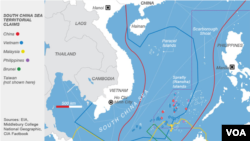The Philippines says China's land reclamation efforts on a group of remote and disputed reefs in the South China Sea is bad for the environment and costly for neighboring countries.
The Philippine Foreign Affairs department says China’s reclamation work on seven reefs among the Spratly Islands in the South China Sea amounts to $100 million in economic losses yearly for neighboring states.
The department said Monday 121 hectares of coral reefs are being destroyed as artificial islands take shape. The reefs are breeding grounds for the region's abundant sea life.
The Philippines claims all but one of the reefs in question. China claims practically the entire sea.
In a statement Thursday, China’s Foreign Ministry Spokeswoman Hua Chunying said developers are using “high environmental standards” and that the sea’s ecology “will not be damaged.” She says once the islands are completed they are expected to meet civilian needs and satisfy “the need for necessary military defense.”
Philippine National Defense spokesman Peter Paul Galvez says the new islands will essentially give China “control of the whole area.”
“It will practically change the security landscape in the next three years, in the medium term, or in three-four years," said Galvez. "
Galvez likens Beijing’s reclamation of outcroppings Manila claims to “a fifth grader taking a kindergartner’s lunchbox.”
Brunei, Malaysia, Taiwan and Vietnam also have overlapping claims in the South China Sea.
The Philippines has questioned China’s claims to practically the entire sea in a case with the Permanent Court of Arbitration. China rejects arbitration and is not participating in the case.
On the day Hua spoke about the reclamation work, United States President Barack Obama told a town hall meeting in Jamaica that China is “using its sheer size and muscle to force countries into subordinate positions.” His remarks came after several high level U.S. defense officials made similar statements.
Over the weekend the Philippine Foreign Affairs department released a statement highlighting the U.S. statements and pointed out “growing international concern” over the reclamation. Manila says the activities are “contrary to international law.”
Carl Thayer, a security analyst with the Australian Defense Force Academy, says the Philippines approach to the issue involves countering China’s assertions while trying to persuade other nations to view the dispute from Manila's perspective.
“To even get more support onboard, particularly in Southeast Asia where environmental issues are of concern," Thayer explained. "It’s just another string in their bow. The major thing: what are China’s intentions? But if you’re going to start dumping sand and concrete on coral reefs, what’s the impact?”
Without naming the United States, China said countries that have no claim in the sea should not take sides in the disputes and “do more to promote regional peace and stability.”





